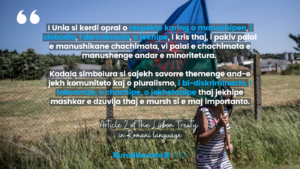 On International Roma Day and the 50th anniversary of the First Romani Congress, Eurodiaconia would like to express concern about the ongoing distressing conditions faced by Roma throughout the COVID pandemic.
On International Roma Day and the 50th anniversary of the First Romani Congress, Eurodiaconia would like to express concern about the ongoing distressing conditions faced by Roma throughout the COVID pandemic.
April 8th is a day to celebrate Romani culture and heritage and raise awareness about the unequal treatment of Roma people. This year, it is also the 50th anniversary of the First Romani Congress held in 1971, which sought amongst other things to preserve Roma culture, affirm the Roma denomination, anthem, and flag, and advocate for the rights of Roma people.
Roma people have disproportionately suffered from the COVID-19 pandemic and the associated lockdowns and national restrictions across Europe. Our members report that Roma have been highly affected by lack of access to education and employment during the closure of schools and job loss. Many Roma children do not have access to the digital resources required for them to continue their studies and have also been highly affected by the loss of school meals. As many Roma work in irregular and precarious employment, the loss of jobs has not been mitigated by social protection. Furthermore, many Roma living in segregated settlements lack access to adequate sanitation, safe housing, and basic public infrastructure. Perhaps most disturbingly, in many cases Roma have been perceived as a public health threat by local authorities and communities and have been scapegoated and subjected to anti-Roma rhetoric and violence.
The recent adoption of the EU Roma strategic framework on Roma equality, inclusion, and participation is an important step towards realizing the rights of Roma and ensuring that their active participation in society is prioritized. However, the goals of the framework will remain hollow without concrete commitments by Member States to achieve these goals and adequate funding allocated towards Roma inclusion through national Recovery and Resilience plans.
Social protection and assistance in areas of health, education, housing, and access to employment are essential to achieving the goals of the framework. Eurodiaconia urges all Member States to enable access to such social protection and assistance and to implement the framework with the active participation of Roma and pro-Roma civil society.
Eurodiaconia strongly believes that exclusion and antigypsyism is harmful for all of society, and that everyone benefits from equality. Therefore, it is vital that Roma inclusion is prioritised in the process of recovery and building resilience in Europe.